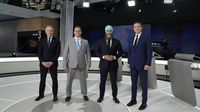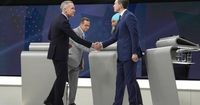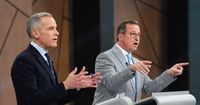In a highly anticipated French-language leaders' debate held on April 16, 2025, Liberal Leader Mark Carney faced off against his chief rival, Conservative Leader Pierre Poilievre, in a contest that could significantly influence the upcoming election on April 28. The debate, which was conducted in Montreal, a city pivotal to the electoral landscape, saw Carney defending his stance against a barrage of accusations from Poilievre, who claimed that Carney was merely a continuation of former Prime Minister Justin Trudeau's unpopular policies.
Carney, who has been in his leadership role for just over a month, asserted his independence from Trudeau, stating, "You're not Justin Trudeau and I'm not Justin Trudeau either, OK?" He emphasized that the current election is about who is capable of confronting U.S. President Donald Trump, particularly in light of the ongoing trade tensions and tariffs that have been a central issue in Canadian politics.
During the debate, Poilievre criticized Carney for his previous role as an economic adviser to Trudeau, suggesting that re-electing the Liberals would only perpetuate the status quo. He stated, "The problem, Mr. Carney, is your party has been in power for 10 years. You are just like Justin Trudeau. We need change." Carney countered these attacks by highlighting the urgency of the situation, saying, "We are in a crisis, the most serious crisis of our lives. We need to react with resounding and overwhelming strength. We need a government ready to act." He pointed to his recent policy actions, including cutting the carbon tax and initiating trade talks with the U.S., France, and the U.K., as evidence of his commitment to change.
Despite being less fluent in French than his opponents, Carney managed to hold his own during the debate, with polling experts noting that he exceeded expectations and made no significant errors. Jean-Marc Leger, head of the Quebec-based polling firm Leger, remarked on Carney's performance, stating that he handled the debate well, given his language challenges.
The debate also touched on immigration policies, a contentious issue in Canadian politics. Poilievre accused the Liberal government of allowing the immigration system to "spiral out of control," while Carney acknowledged that the system had issues, agreeing with debate moderator Patrice Roy that immigration had "gone off the rails" during the post-pandemic period. Carney promised to implement a cap on population growth to make the influx of newcomers more manageable, particularly in the context of a strained healthcare system.
Singh, the leader of the New Democratic Party, was vocal throughout the debate, criticizing both Carney and Poilievre for their approaches to healthcare and immigration. He accused Poilievre of planning deep cuts to public services to fund tax cuts for the wealthy, stating, "We want our healthcare system to be nothing like the American one." Singh's fiery rhetoric included a jab at Carney for meeting with King Charles during a recent trip to the U.K. while not addressing pressing issues like employment insurance for the unemployed.
Bloc Québécois Leader Yves-François Blanchet also participated in the debate, asserting that Quebecers need to elect more of his party's MPs to safeguard the province's interests in Ottawa. He criticized Carney for focusing too much on Ontario, particularly regarding a $2 billion auto relief program aimed at countering Trump's threats to Canadian industries.
As the debate progressed, it became clear that the leaders were not only vying for votes but also attempting to define their party's positions on critical issues facing Canadians. Poilievre's promises to dismantle environmental regulations and boost oil and gas development were met with skepticism from Singh, who argued that such policies would lead to an "Americanization" of Canada.
Carney's assertion that he is his own man and not responsible for the previous government's failures was a recurring theme. He stated, "I've just become leader. I've been prime minister for a month," emphasizing the need for voters to consider his new leadership rather than past Liberal policies.
Overall, the debate was characterized by a mix of attacks and defenses, with each leader attempting to carve out their identity in a rapidly changing political landscape. The stakes are high as the election approaches, with polls indicating that the ruling Liberals are currently ahead of the Conservatives, but the outcome remains uncertain as voters weigh their options.
The leaders will face off again in an English-language debate on April 17, 2025, where they will have another opportunity to address the pressing issues that matter most to Canadians.






